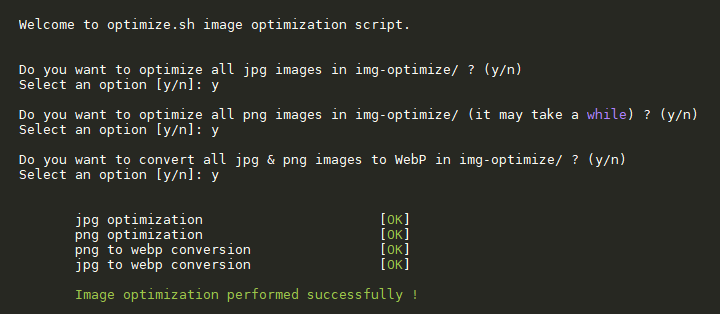121 lines
3.7 KiB
Markdown
121 lines
3.7 KiB
Markdown
# Image optimization bash script
|
|
|
|

|
|
|
|
[](https://travis-ci.org/VirtuBox/img-optimize)    
|
|
|
|
## Prerequisite
|
|
|
|
- jpegoptim for jpg optimization
|
|
- optipng for png optimization
|
|
- cwebp for WebP conversion
|
|
|
|
### From APT repositories
|
|
|
|
Debian/Ubuntu :
|
|
|
|
```bash
|
|
sudo apt install jpegoptim optipng webp -y
|
|
```
|
|
|
|
Centos 7 :
|
|
|
|
```bash
|
|
sudo yum install optipng jpegoptim libwebp-tools -y
|
|
```
|
|
|
|
### Compile the latest release (optipng & libwebp)
|
|
|
|
For Debian/Ubuntu (available in scripts folder) :
|
|
|
|
```bash
|
|
# optipng
|
|
curl -sL git.io/fjddn | sudo -E bash
|
|
|
|
# libwebp
|
|
curl -sL git.io/fjdd6 | sudo -E bash
|
|
```
|
|
|
|
--------------------------------------------------------------------------------
|
|
|
|
## Installation
|
|
|
|
1) Clone the repository
|
|
|
|
```bash
|
|
git clone https://github.com/VirtuBox/img-optimize.git $HOME/.img-optimize
|
|
```
|
|
|
|
2) Install the script
|
|
|
|
**Method 1** : Add an alias in .bashrc
|
|
|
|
With this method img-optimize can only be used by the current user
|
|
|
|
```bash
|
|
echo "alias img-optimize=$HOME/.img-optimize/optimize.sh" >> $HOME/.bashrc
|
|
source $HOME/.bashrc
|
|
```
|
|
|
|
**Method 2** : Add an alias to the script in /usr/local/bin
|
|
|
|
With this method img-optimize can be used by all users
|
|
|
|
```bash
|
|
sudo ln -s $HOME/.img-optimize/optimize.sh /usr/local/bin/img-optimize
|
|
sudo chmod +x /usr/local/bin/img-optimize
|
|
```
|
|
|
|
## Usage
|
|
|
|
```bash
|
|
Bash script to optimize your images and convert them in WebP
|
|
Usage: img-optimize [options] <images path>
|
|
If images path isn't defined, img-optimize will use the current directory
|
|
Options:
|
|
--jpg <images path> ..... optimize all jpg images
|
|
--png <images path> ..... optimize all png images
|
|
--webp <images path> ..... convert all images in webp
|
|
--nowebp <images path> ..... optimize all png & jpg images
|
|
--all <images path> ..... optimize all images (png + jpg + webp)
|
|
-i, --interactive ..... run img-optimize in interactive mode
|
|
-q, --quiet ..... run image optimization quietly
|
|
Other options :
|
|
-h, --help, help ... displays this help information
|
|
Examples:
|
|
optimize all jpg images in /var/www/images
|
|
img-optimize --jpg /var/www/images
|
|
```
|
|
|
|
## Update the script
|
|
|
|
To update the script, just run :
|
|
|
|
```bash
|
|
git -C $HOME/.img-optimize pull
|
|
```
|
|
|
|
## Setup daily cronjob
|
|
|
|
You just have to copy the scripts to /etc/cron.daily :
|
|
|
|
```bash
|
|
cp $HOME/.img-optimize/crons/jpg-png-cron.sh /etc/cron.daily/jpg-png-cron
|
|
cp $HOME/.img-optimize/crons/jpg-png-cron.sh /etc/cron.daily/webp-cron
|
|
|
|
chmod +x /etc/cron.daily/jpg-png-cron
|
|
chmod +x /etc/cron.daily/webp-cron
|
|
```
|
|
|
|
Then just edit your websites path set with the variables `sites` at the beginning of the cron scripts.
|
|
|
|
## Warning
|
|
|
|
Conversion process can take a while, you can use `tmux` to launch the script and be able to close your ssh connection without interrupting conversion. Then just use `tmux attach` to login back in your tmux session.
|
|
|
|
## Credits
|
|
|
|
- WebP conversion script was inspired by this [DigitalOcean Community Tutorial](https://www.digitalocean.com/community/tutorials/how-to-create-and-serve-webp-images-to-speed-up-your-website)
|
|
|
|
- Tutorial about webp conversion available on [jesuisadmin.fr](https://jesuisadmin.fr/convertir-vos-images-en-webp-nginx/) (in french)
|